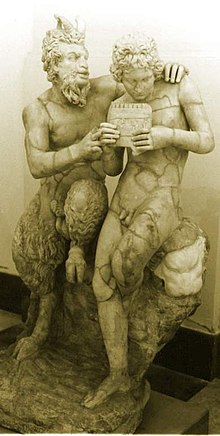Bread (mythology)
Pan (Greek: Πάν) was the god of shepherds and flocks in Greek mythology. He was especially revered in Arcadia, despite no major shrines to him in that region. In Roman mythology, this god is identified as a Faun.
Pan was also the god of fertility and male sexuality. Endowed with great power and sexual appetite, he dedicated himself to chasing nymphs and girls through the forests, in search of his favors.In many aspects, the god Pan has a certain similarity with Dionysus.
He was the god of dawn and dusk breezes. He lived in the company of the nymphs in a cave on Parnassus called Coricia. Prophetic gifts were attributed to him and he was part of Dionysus' courtship, since he was supposed to follow him in his customs. He was a hunter, healer and musician. He lived in the forests and jungles, running after the sheep and scaring the men who entered his land.
He carried the crook or shepherd's staff in his hand and played the syrinx, which is also known as Pan's flute. He liked the fountains and the shade of the forests, among whose undergrowth he used to hide to spy on the nymphs.
It is said that Pan was especially hot-tempered if disturbed during his naps. The inhabitants of Arcadia had the belief that, when a person took a nap, they should not be woken for any reason, since, in this way, the sleep of the god Pan was interrupted. In this case, Pan approximates the notion of Demonium Meridianum (Demon of the Midday).
Lastly, as a deity, Pan represented all of wild nature. In this way, he was credited with generating maddening fear. Hence the word panic, which, in principle, meant the massive fear suffered by herds and herds before the thunder and lightning strikes.
Genealogy
Pan has nineteen different genealogies; in most of them her father was Hermes, while her mother's name varies (usually she would belong to the race of nymphs; a daughter of Dryope, Timbris, Sose, Callisto, or Orneo).
According to one of the traditions, when Hermes was shepherding Dryope's flocks, he had a loving relationship with one of his daughters, from whom the god Pan was born. of a goat and the rest of the body with the appearance of a man. On his head were two horns and his face was wrinkled, with a prominent chin, his entire body covered in a thick layer of hair. It is said that, as soon as he was born, he escaped to the mountains, where Hermes had to look for him to take him to Olympus wrapped in a hare's skin. Once there, they called it Pan, since it was everyone's amusement.
Another tradition tells that Penelope, during the absence of her husband Odysseus, had several lovers, becoming pregnant by one of them. In this way, Pan was born, a name that means son of all.
Another of them said that, after returning from his travels, Odysseus disowned Penelope for her infidelities and that, once abandoned, she conceived the god Pan, the fruit of her union with Hermes.
Other traditions suggest that he was the son of Zeus and the nymph Hibris, of Zeus and Callisto, or of Hermes and a nymph.
As for his descendants, it varies according to the author. In Nono's Dionysiacs it is said that Pan fathered the twelve loaves, a race of minor satyrs who collaborated with Dionysus. In other sources he appears as the father of Croto (with Euterpe, a muse), Acis (with Simetis), Eurymedon (without specifying the woman), Creneo (with the nymph Ismenide or Ismenis), Iinge (with the nymph Eco) and finally the also famous Silenus (had with the Oceanide Melia).
Relations with other mythological characters
As for his relationships, it is said that he had reciprocated love affairs with the nymph Pitis, who was also wanted by Boreas. The latter, driven by jealousy, threw Pitis from the top of a rock. Feeling sorry, the goddess Gea transformed her into a pine tree, being her Pan, since then, crowned with pine leaves. There is also a belief that the pine groans when Boreas blows.
Also, Pan was intensely in love with the nymph Syrinx, who did not reciprocate. It is said that once, while fleeing from Pan, he jumped into the river Ladon. She was cornered and asked for help from her sisters, her nymphs, who, moved, turned her into a cane field. It is said that when Pan arrived, he could only embrace the reeds that swayed in the wind and the noise they produced caused him such pleasure that he decided to build a new musical instrument with them. Thus, he created the syrinx flute, in memory of the nymph of the same name.
In the same way, he seduced Selene by giving her a fleece of great whiteness. Since then, both were venerated in a cavern on Mount Lyceum.
Worship
According to Herodotus, a few days before the battle of Marathon, an Athenian messenger who was returning from asking Sparta for help found the god and he promised him that they would defeat the Persians. Therefore, after effectively winning the battle due to a sudden panic in the enemy ranks, he was listed among the great gods recognized by the state. In the city of Athens itself, one of the caves on the northern slope of the Acropolis was consecrated to him and an annual festival was decreed in his honor where torch races were held.
Mounts Menalus, Lampea and Nomia were also sacred to Pan, all of them in Arcadia. On the other hand, in Licosura there was an oracular sanctuary of Pan.
The original fertility rites were taken over from the 5th century by the Bacchae, which lasted well into the Middle Ages. Since then, and to this day, the traditional image of Pan is associated with the image of the devil (in the form of a goat) and covens.
Contenido relacionado
Mercury (mythology)
Pontus (mythology)
Triskaidekaphobia

